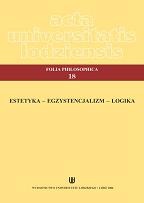Umberto Eco: powtórzenie i pozaestetyczny sens awangardy
Umberto Eco: Repetition and the Extra-Aesthetic Meaning of the Avant-Garde
Author(s): Tomasz ZałuskiSubject(s): Philosophy
Published by: Wydawnictwo Uniwersytetu Łódzkiego
Keywords: Umberto Eco; Avant-Garde;
Summary/Abstract: The subject matter of the text is an examination of the role the problem of repetition plays in cognitive, social and anthropological aspects of the artistic avant-garde as those are viewed from the standpoint of Umberto Eco's semiology. In Eco's "The Open Work" and "The Absent Structure" the above-mentioned problem takes the form of the concept of redundancy. The latter must be analysed in its relation with the concept of information, as they constitute each other; additionally, they shape Eco's approach to the world of signs, being therefore a kind of conceptual infrastructure of his discourse. The author demonstrates that there are in Eco two interpretations of the relation between information and redundancy. According to the one that Eco himself calls "dialectical", the two concepts, although purported to be inextricably linked, remain opposed to each other: information is held to be a function of challenging established communicational codes, thus opening up a possibility of multiple interpretations of signifying structures, whereas redundancy does not question those codes and guarantees communication of single univocal meaning. As for the other, more complex interpretation, the author maintains that a sketch of it can be found on the margins of Eco's discourse. It is largely implicit there and the author makes an attempt to throw it into relief under the name of ostentatious redundancy. The latter oscillates, in a highly ambiguous manner, between confirming and challenging communicational codes. By the same token it can be regarded not as opposing information but as creating it, or even as being, paradoxically, informative in itself. The tension between the two interpretations shapes Eco's internally divided approach to the question of the avant-garde and its cognitive, social and anthropological aspects. Discussing these aspects, the author indicates that Eco has recourse, obliquely, to ostentatious redundancy every time the dialectical interpretation, which i san explicit driving force of his discourse, poses serious difficulties and starts to undermine itself. Ostentatious redundancy is therefore shown to play an important role in all the avant-garde's aspects as well as to govern Eco's reinterpretation of the concept of "avant-garde" itself and his critical re-examination of modernist aesthetics. Finally, it has a strong connection with Eco's theory of the open work. Advocating a further development of the concept of ostentatious redundancy, the author argues that it may and should, with all its necessary internal complexity, be used for analysing contemporary artistic practices.
Journal: Acta Universitatis Lodziensis. Folia Philosophica. Ethica - Aesthetica - Practica
- Issue Year: 2006
- Issue No: 18
- Page Range: 69-101
- Page Count: 33
- Language: Polish

